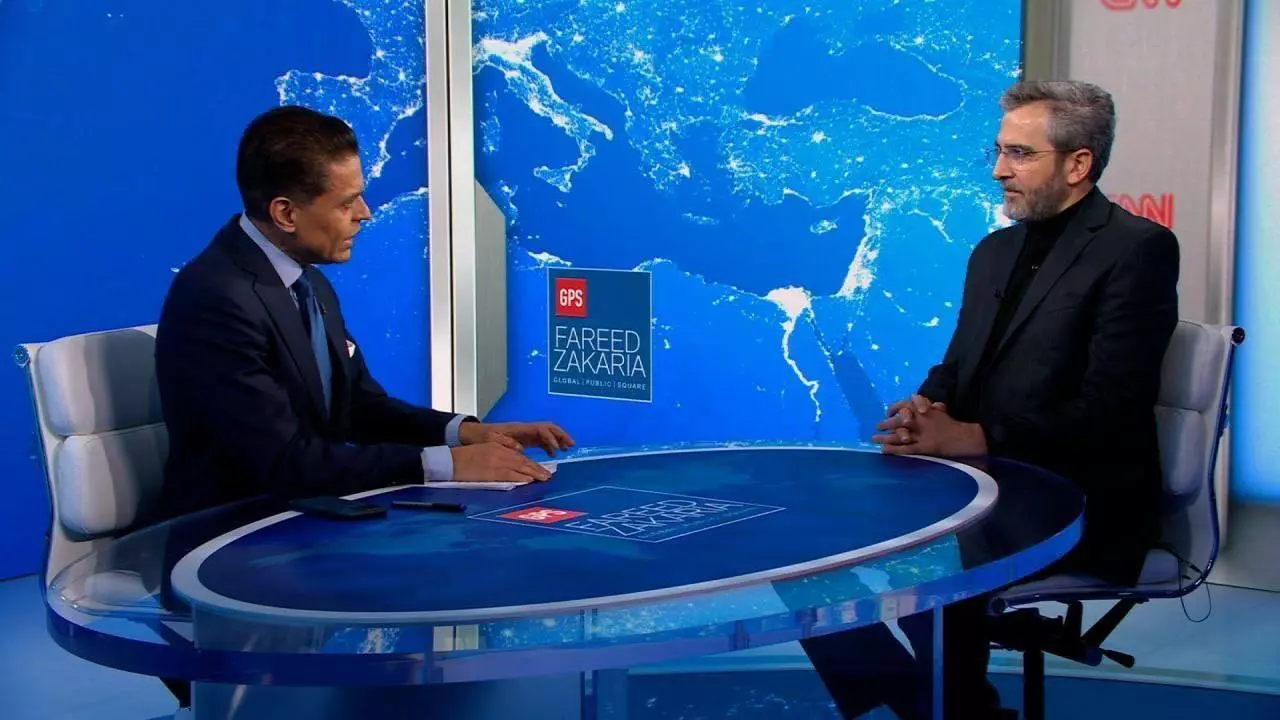Ali Bagheri Kani’s Multifaceted Approach in His Interview with CNN: Diplomacy and Consequences
WANA (July 20) – Ali Bagheri Kani, Iran’s Deputy Foreign Minister, provided a significant opportunity to examine Iran’s stance on international and domestic issues during his interview with CNN. This interview not only demonstrates Iran’s efforts to redefine its role in global affairs but also contains strategic, multi-layered messages that require careful analysis.
1. Proposal for a Referendum in Palestine: A Multifaceted Game
Ali Bagheri Kani’s proposal for a “referendum in Palestine” is a skillful diplomatic move. While it is presented as a democratic solution to the Palestinian issue, it is a multifaceted strategy aimed at several objectives:
– Redefining Iran’s Role in the Region: By offering this proposal, Iran seeks to position itself as a key player and supporter of people’s rights, particularly in contrast to Arab countries that might take a different path.
– Strengthening Public Diplomacy: This proposal is a smart move in public diplomacy that can garner widespread support and appeal to human rights organizations.
– Exerting Psychological Pressure on Israel: By putting forth this proposal, Iran indirectly portrays Israel as the main obstacle to peace and democracy in the region, potentially increasing international pressure on Israel.
2. Legal Pursuit of Qasem Soleimani’s Assassination: Legal Diplomacy Instead of Military Response
Bagheri Kani’s focus on the legal pursuit of General Qasem Soleimani’s assassination signifies a strategic shift from “military response” to “legal diplomacy.” This change helps reduce military tensions and shows Iran’s diplomatic maturity in using international legal and judicial tools. This strategy can be beneficial in several ways:
– Increasing International Legitimacy: By pursuing this matter legally, Iran presents itself as a country committed to international law.
– Reducing Regional Tensions: This approach, instead of creating more military conflicts, helps to reduce tensions and foster a climate of dialogue.
– Gaining International Support: Utilizing legal mechanisms can attract more international support and strengthen Iran’s position in negotiations.

WANA – Bagheri in an interview with CNN
3. Strengthening Resistance Against Israel: Sending Mixed Messages
Bagheri Kani’s emphasis on the unity and solidarity of resistance movements sends a clear message to Israel and its supporters: their aggressive and oppressive policies have not weakened the resistance but have made it more robust. This stance conveys various messages:
– Consolidating the Axis of Resistance: Emphasizing unity and solidarity helps strengthen the resistance axis and increase pressure on Israel.
– Increasing Tensions: This approach may escalate regional tensions and conflicts, ultimately harming regional security and stability.
– Encouraging Negotiations: At the same time, this stance can urge Israel and its supporters to seek diplomatic solutions.
4. Domestic Issues: A New Narrative of Economic Resilience
Bagheri Kani highlighted Iran’s economic successes in coping with sanctions during parts of the interview. Although these statements seem more promotional, they reflect Iran’s efforts to create a new narrative of economic resilience. This effort includes several key elements:
– Boosting National Morale: Emphasizing economic successes under sanctions boosts national morale and internal confidence.
– Attracting Foreign Investment: Iran aims to attract foreign investors and reduce reliance on internal resources by demonstrating economic management capabilities.
– Alleviating Social Pressures: This narrative can help reduce social pressures and public dissatisfaction, although economic realities present many challenges.
5. Overall Implications of the Interview: Between Engagement and Confrontation
Ali Bagheri Kani’s interview has various implications. On one hand, his statements can bolster Iran’s standing among friendly and allied countries, especially in the Islamic world. On the other hand, his firm stance and inflexibility towards sanctions and international pressures might lead to increased tensions and new sanctions. These contradictions reflect the duality of engagement and confrontation in Iran’s foreign policy.
The Need for More Balanced Strategies
It appears that Iran should pursue more balanced and realistic strategies. By using active and constructive diplomacy, Iran should aim to reduce tensions and improve the country’s economic and social conditions. Positive engagement with the international community and legal and diplomatic tools can strengthen Iran’s position on the global stage and garner international support.
This strategy can improve the people’s living conditions, reduce internal dissatisfaction, and enhance Iran’s international credibility.












